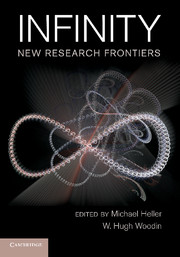Book contents
- Frontmatter
- Contents
- Contributors
- Preface
- Acknowledgments
- Introduction
- I Perspectives on Infinity from History
- II Perspectives on Infinity from Mathematics
- III Technical Perspectives on Infinity from Advanced Mathematics
- IV Perspectives on Infinity from Physics and Cosmology
- V Perspectives on Infinity from Philosophy and Theology
- 11 God and Infinity: Directions for Future Research
- 12 Notes on the Concept of the Infinite in the History of Western Metaphysics
- 13 God and Infinity: Theological Insights from Cantor's Mathematics
- 14 A (Partially) Skeptical Response to Hart and Russell
- Index
- References
11 - God and Infinity: Directions for Future Research
Published online by Cambridge University Press: 07 June 2011
- Frontmatter
- Contents
- Contributors
- Preface
- Acknowledgments
- Introduction
- I Perspectives on Infinity from History
- II Perspectives on Infinity from Mathematics
- III Technical Perspectives on Infinity from Advanced Mathematics
- IV Perspectives on Infinity from Physics and Cosmology
- V Perspectives on Infinity from Philosophy and Theology
- 11 God and Infinity: Directions for Future Research
- 12 Notes on the Concept of the Infinite in the History of Western Metaphysics
- 13 God and Infinity: Theological Insights from Cantor's Mathematics
- 14 A (Partially) Skeptical Response to Hart and Russell
- Index
- References
Summary
Philosophical investigation – in particular, metaphysical investigation – is rarely advanced through the consultation of dictionaries. In the present case, however, it will repay us to begin by considering the entries for “infinite,” “infinity,” and “the infinite” that are found in the OED (The Oxford English Dictionary, Vol. V, H-K):
Infinite adj. (omitting obsolete and archaic uses)
Having no limit or end (real or assignable); boundless, unlimited, endless; immeasurably great in extent, duration, or other respect. Chiefly of God or His attributes; also of space, time, etc., in which it passes into the mathematical use.
In loose or hyperbolical sense: Indefinitely or exceedingly great; exceeding measurement or calculation; immense, vast.
Math. Of a quantity or magnitude: Having no limit; greater than any assignable quantity or magnitude (opp. to finite). Of a line or surface: Extending indefinitely without limit, and not returning to itself in any finite distance (opp. to closed).
Infinite series: a series of quantities or expressions which may be indefinitely continued without ever coming to an end (but may or may not have a finite value or “limit” to which it approaches as more and more terms are taken).
Gram. Applied to those parts of the verb which are not limited by person or number.
Infinite absol. or as sb.
That which is infinite or has no limit; an infinite being, thing, quantity, extent, etc. Now almost always in the sing. with the; esp. as a designation of the Deity or the absolute Being.
Math. An infinite quantity.
- Type
- Chapter
- Information
- InfinityNew Research Frontiers, pp. 233 - 254Publisher: Cambridge University PressPrint publication year: 2011
References
- 4
- Cited by



